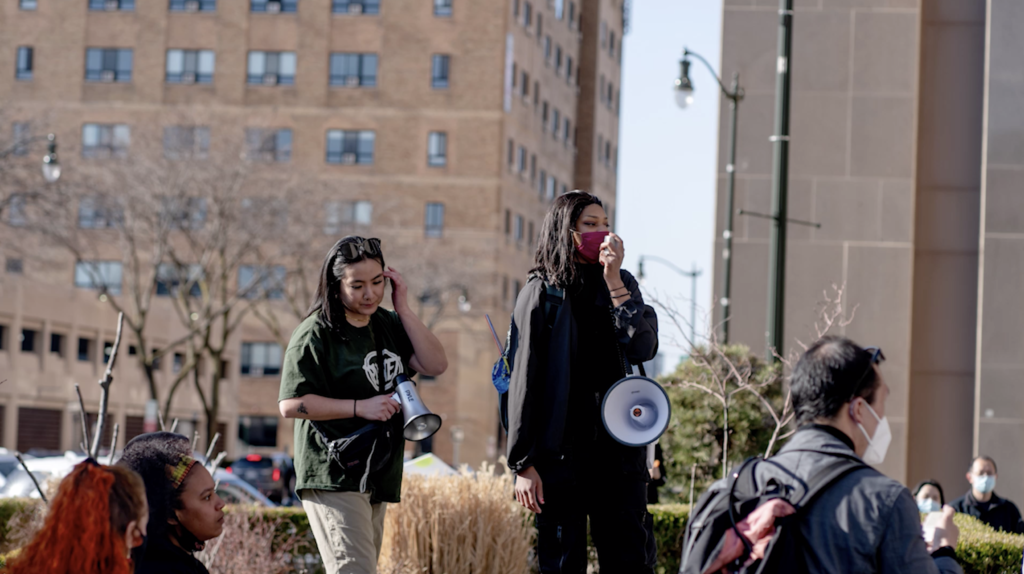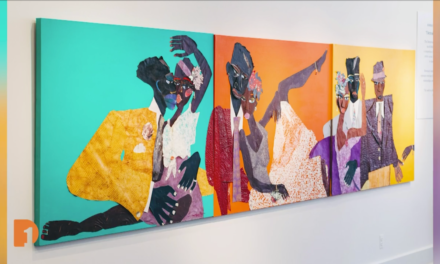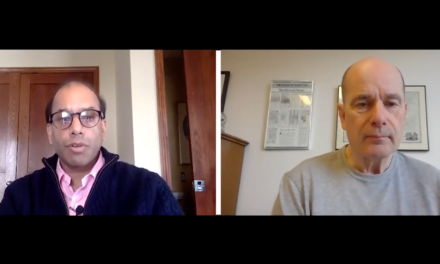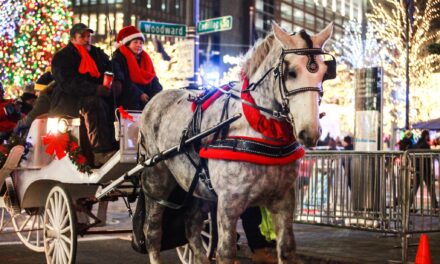When a gunman killed eight people, including six women of Asian descent, last year in the Atlanta spa shootings, Zora Bowens called her best friend Ceena Vang to check in on how she was feeling. Though Zora also began to notice a pattern in the nation’s latest mass shooting events: instances of violence escalating to mass murder. Feeling called to act and denounce these forms of racism against Asian Americans, Bowens and Vang created the activist organization Whenever We’re Needed and began holding rallies around Southeast Michigan.
RELATED: WDET | AAPI Stories: “Just Show Up”: Detroit Activists Work to Build Bridge Between Communities

Ceena Vang, left, and Zora Bownes, right, stand up and speak through megaphones at a rally hosted by their activist organization Whenever We’re Needed.
Now, one year after the Atlanta spa shootings, One Detroit’s Zosette Guir and WDET’s Digital Editor, Dorothy Hernandez, sit down with the activist duo as they reflect on the first rally they held and the impact they’ve had on the community. Plus, they express what it means to be creating and carrying on a legacy of activism together.
This story was created in partnership with WDET Radio for our collaborative AAPI Story Series. You can check out the series here.
Full Transcript:
Dorothy Hernandez: After a gunman killed 8 people, including 6 women of Asian descent, last year in Atlanta, Zora Bowens called her best friend, Ceena Vang. She wanted the check-in on how she was feeling, but Zora had also started to notice a pattern similar to what led to the George Floyd protests, instances of violence escalating to murder. The two of them felt call to action and created the activist organization, “Whenever We’re Needed”. They sat down together in conversation to reflect on the impact they’ve had since organizing their first rally and the work that still needs to be done, in the latest story in DPTV’s and WDET’s AAPI Stories.
Zora Bowens, Co-Founder, Whenever We’re Needed: So how did you feel last year, and the year before, when all of this tension started building up around hate towards the Asian community?
Ceena Vang, Co-Founder, Whenever We’re Needed: I honestly felt very desensitized to it. Of course, when it became an ongoing thing, it was shocking. But I think that naturally, it’s so easy to just become desensitized to hate crimes that everyone witnesses on a daily basis. But I feel like it wasn’t until, you had called me that day where you brought it up to my attention, and that’s truly what inspired me to feel that we should do something, like that’s when I felt called to action. Because, if my friend who isn’t Asian but is also a person of color, can see something that I know exists and is kind of reminding me like, Hey, let’s do something, like that for me was the push to get up and do something with you.
Zora Bowens: Just, you know, you kind of especially with social media, it’s like a constant bombarding of things that are happening. But, you know, after the George Floyd protests kind of settled down and we started following the trials and everything like that. So, the night before I called you, I actually got stopped by the police in Hamtramck, and I was so scared because obviously everything that happens with black people and police interactions sometimes, and the police interaction was actually so nice.
It was the most polite police interaction I’ve ever had. And that’s when I realized, the work that we’ve done has maybe had an impact. And also, I felt like my community was going to be OK. When I saw the news about the spa shooting, it felt like I had the capacity for it now. Like a divine message was happening, like, we both just felt like this was like some divine-like, you guys need to do this, kind of thing. Seeing the crowd was just like, you know, overall, it was nice to see that the consensus was, I’m ready to do this for my community. And it was just an overwhelming number, I did not think that many people were going to be there
Ceena Vang: To be here gathered today in unity, but unfortunately for such a devastating purpose. However, it is a mix of anger, frustration, sadness, mixed with feeling eager, feeling liberated. But truly, the reason why we are here is bittersweet. It’s a proud moment. I wasn’t expecting it either.
I remember, like, just kind of standing on that podium thing, it was an actual podium, but just like looking into the crowd and seeing so many familiar faces and faces we’ve never met before, but it was really nice to be able to bring so many people together that really cared about a cause about, you know, stopping hate and just unity in general.
It was definitely a big first time for a lot of the older generation there, and it was nice to have them come out, especially like when the older Asians have been such a big target and all of the hate crimes. You and I, we just see each other as just two individuals just trying to give a platform, you know? But it was nice to be able to, you know, receive that recognition from the Asian community and be able to give back to them.
Zora Bowens: One thing that I really want to know about the Atlanta shooting is that it really seems to parallel the Charleston church shootings in 2015, when hate crimes against black people began to spike. The shooter was coddled and protected, just like now. Some things that stuck with me, were like people talking about the history of Asian people, Asian Americans in this country.
And just the contributions and, really, it’s a problem because we really are not taught a lot about Asian-American history in our classes and like how long Asian people have been in America and what they’ve done, you know, to help build this country. I feel like the Asian-American community’s place in America, and in our minds, has not been solidified that they belong in America because we’re not taught that they’ve been here forever.
Ceena Vang: It does not matter who you are, where you are, and where you come from, or what you believe in, we all want the same thing at the end of the day. We want peace, we want love, we want acceptance, we want respect, and we all strive for a better world.
Zora Bowens: First of all, we weren’t even expecting to turn into an organization. So, then we definitely weren’t expecting to host more protests. But it all kind of just, like, one thing I’ve learned with also talking to other protest leaders too is like, we all have a similar story like, you don’t choose to be a protest leader, you just fall into it and the pieces just come one after another.
Ceena Vang: Yeah, you just figure it out as you go along. I think, I mean, I think that’s what just life is, it’s just, we’re all just winging it.
Zora Bowens: What do you think the biggest challenge is moving forward?
Ceena Vang: I think that a big challenge is getting people to stay involved and to stay engaged, because there’s always so many ongoing things happening in the world, you know, like I said, it’s easy to become desensitized. But how do we find, you know, other activists or how do we change like the hearts, the minds of people who only see tunnel vision?
Zora Bowens: We’ve been thinking more deeply about, how can we really impact our communities in a way that creates some physical change and some really grassroots change that people can actually truly be impacted by in their day to day. When you have so many emotions in the beginning of a protest, like everyone’s talking about it, and you protest and you feel good, and you protest again and you feel good, and then, you know, the protests die out and it’s like people tend to forget.
Ceena Vang: Exactly like, how do we continue to channel the anger and the frustration. You know, just because you don’t hear about it anymore doesn’t mean it’s gone away. So, what I want to do, is to give it relevancy. So, this is where it all started a year ago. We are commemorating the lives of the victims that were lost due to the spa shooting, but not just them, everyone from then until now. And it’s important we do that to make sure that everyone is remembered and to make sure that things like this don’t happen again.
Zora Bowens: I just think that over the last year, there has been so many victims of anti-Asian hate crimes that, you know, we need to have a moment for. But not only just a vigil but to celebrate these lives of these people and really bring them back to the forefront of our minds and our hearts.
Ceena Vang: I think it makes sense to have, you know, our one year there tying in like our one year of existing as an organization and our one year of commemorating the memories of these victims.
Zora Bowens: I hope that, you know, everyone will join us. I just want everyone to know that we have been working, we haven’t forgotten, that this is still important to us, and that we should be together to remember that day and remember these lives that were lost.
Subscribe to One Detroit’s YouTube Channel & Don’t miss One Detroit Mondays and Thursdays at 7:30 p.m. on Detroit Public TV, WTVS-Channel 56.
Catch the daily conversations on our website, Facebook, Twitter @DPTVOneDetroit, and Instagram @One.Detroit
View Past Episodes >
Watch One Detroit every Monday and Thursday at 7:30 p.m. ET on Detroit Public TV on Detroit Public TV, WTVS-Channel 56.




